Spotlighting The Arc’s Changemakers: Kenneth Oakes, Immediate Past President
A childhood friendship sparked Ken Oakes’ lifelong dedication to the disability community. His mom’s cousin Louise had Down syndrome and was only 10 years older than him, making her part of Ken’s inner circle growing up. This early exposure ignited a drive to serve, though he didn’t know where it would lead him yet. Ken always wanted to teach, but had his sights set on high school social studies. A college observation requirement opened the doors to teaching children with disabilities. Though hesitant at first, as Ken shares, “I fell in love with it.” That summer, he applied to teach at a summer school for students with intellectual and developmental disabilities (IDD), the G.A. Barber Center run by The Arc of Erie County. For the next 47 years, he devoted his career to special education and as an advocate for children and adults with disabilities and their families.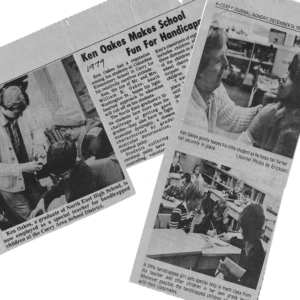
The Arc has continued to shape Ken’s career and volunteer work since 1976. He spent college summers working at the Barber Center and volunteering with The Arc of Erie County, becoming President of the Erie Youth Arc. Every summer, he and his fellow Youth Arc volunteers from across the state would go to a state-run institution for people with IDD. They would spend the weekend there to paint rooms and “brighten up their world.” While in college, Ken was working part-time in the group homes operated by the G.A. Barber Center. He helped former residents transition to life outside of the institution that they had spent decades confined within. Ken explains, “My whole family got involved. I brought folks to my parents for dinner—and even the holidays if they didn’t have family to spend it with. I just wanted a better life for them.”
After college, Ken went on to spend four decades as a teacher, a program consultant, and an administrator. As Ken says, “special education was my world.” But he will never forget his first day. His students, 7 of whom were full-time wheelchair users and 3 of whom had IDD, arrived 45 minutes later than everyone else and spent their whole day in one classroom. “They didn’t get art, they didn’t get physical education, they didn’t go to the library,” explains Ken. “Because of The Arc, I knew that was wrong. We started eating lunch at a separate table in the cafeteria and going to the gym and library by ourselves. After a couple of weeks, I told my principal that I’d like my students to go to general education classes. By the end of the first quarter, all my kids were in some general education classes, which helped them make friends outside of our classroom. Soon, my kids were having lunch with their new friends, not at a separate table in the cafeteria or in our classroom.” He beams with pride as he remembers Amy, a second grader who had Cerebral Palsy. Her parents were skeptical of her being included in general education. He ran into Amy at the mall four years ago, and, as Ken adds, “she went to college, got married, and is now a social worker. To know she’s achieved so much, I like to think I was part of inspiring her and changing her mother’s mind about what’s possible.”
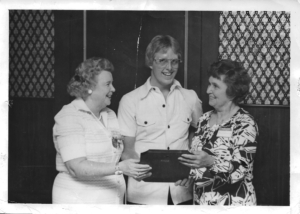 His impact on students didn’t stop in the classroom. After his career as a teacher, he went on to become the Special Education Director in Philadelphia and now teaches graduate school, supervises teachers, and was just appointed by the Governor to serve on Pennsylvania’s Special Education Advisory Panel. He also continued to volunteer with The Arc. “I think I did everything possible with The Arc.” In 2005, The Arc of Pennsylvania asked Ken to represent The Arc on the state’s Right to Education Task Force, which later led to his joining the Boards of The Arc of Philadelphia and The Arc of Pennsylvania, where he served as president of both organizations. He learned more and more about The Arc of the United States and was eager to get involved. He went to National Conventions, joined Committees, and eventually joined the national Board. “I went from organizing days at the zoo to becoming the national President—I was flabbergasted,” shares Ken.
His impact on students didn’t stop in the classroom. After his career as a teacher, he went on to become the Special Education Director in Philadelphia and now teaches graduate school, supervises teachers, and was just appointed by the Governor to serve on Pennsylvania’s Special Education Advisory Panel. He also continued to volunteer with The Arc. “I think I did everything possible with The Arc.” In 2005, The Arc of Pennsylvania asked Ken to represent The Arc on the state’s Right to Education Task Force, which later led to his joining the Boards of The Arc of Philadelphia and The Arc of Pennsylvania, where he served as president of both organizations. He learned more and more about The Arc of the United States and was eager to get involved. He went to National Conventions, joined Committees, and eventually joined the national Board. “I went from organizing days at the zoo to becoming the national President—I was flabbergasted,” shares Ken.
His proudest moments aren’t in serving as President of his local chapters or the national organization. Ken explains, “Because of The Arc, all kids go to public school now and in my state, nobody lives in an institution anymore. To know I had a tiny bit to do with that is what I’m most proud of. I’ve met thousands of teachers, kids, and parents over the years, and I like to think I made life just a little better for them.”
When asked what continues to drive his involvement, Ken emphasizes, “There’s still so much work to be done.” Though life in 2024 is exponentially better for people with IDD than it was five decades ago, issues of isolation and underemployment persist today. He hopes to expand understanding and acceptance of people with IDD in our society. He says, “Be good to them because they’re good neighbors, good students, good friends to your kids, and may make a difference when they grow up.”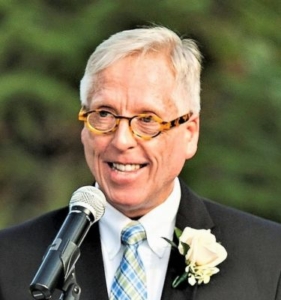
Ken is eager to continue contributing however he can, whether serving on a Board committee or consulting state leaders on teacher shortages. As Ken adds, “I want people to understand that The Arc has been here from the beginning and will be here for the future. We’re never going to stop making life better, one day at a time. The national office and local chapters are driven by families and self-advocates, and you can always count on The Arc.”
As for Louise, her parents kept her sheltered at home well into her adulthood. They passed away when she was in her 40s, and Louise was placed in a group home run by the G.A. Barber Center. She hated it at first. “When she first got there, she ran away twice,” describes Ken. “But little by little, she came to love it. Louise blossomed in the community, and those years were her best. What makes that so special to me is that The Arc made that happen for her, and has done that for hundreds of thousands of people.”


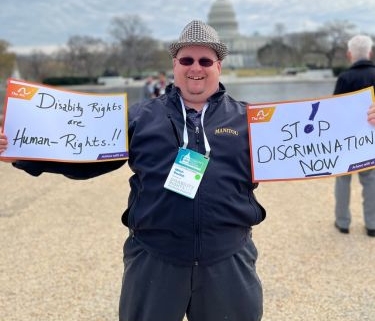
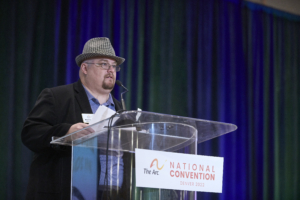
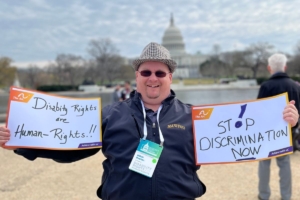

 Betty has always had the innate ability to create a safe space for disabled people. As a child, she would talk to them in the grocery store, at church, and on the street. At the age of 18, she found herself running a daycare center and was drawn to do more for the disabled children who came through her doors. She enrolled in disability studies at Santa Fe College, which was right across the street from The Arc of Alachua County. Upon graduating, The Arc of Alachua County immediately hired her as a DSP. That was 20 years ago, and Betty has never looked back.
Betty has always had the innate ability to create a safe space for disabled people. As a child, she would talk to them in the grocery store, at church, and on the street. At the age of 18, she found herself running a daycare center and was drawn to do more for the disabled children who came through her doors. She enrolled in disability studies at Santa Fe College, which was right across the street from The Arc of Alachua County. Upon graduating, The Arc of Alachua County immediately hired her as a DSP. That was 20 years ago, and Betty has never looked back. role of DSPs, chronic underinvestment in Medicaid’s home and community-based services has led to paltry wages and training, which has created a nationwide shortage of workers. As Betty says, “Spend a day in our shoes. It might seem like what we do is easy, but it’s not. There’s no training, so I had to learn on the job, and there’s not enough staff. Sometimes, I have to work without a break, cover the next shift, or come in on weekends, but I don’t have a problem with that because I want my clients to be happy. Their families tell me all the time that if I wasn’t in their lives, they don’t know what they’d do or where they’d be.”
role of DSPs, chronic underinvestment in Medicaid’s home and community-based services has led to paltry wages and training, which has created a nationwide shortage of workers. As Betty says, “Spend a day in our shoes. It might seem like what we do is easy, but it’s not. There’s no training, so I had to learn on the job, and there’s not enough staff. Sometimes, I have to work without a break, cover the next shift, or come in on weekends, but I don’t have a problem with that because I want my clients to be happy. Their families tell me all the time that if I wasn’t in their lives, they don’t know what they’d do or where they’d be.”


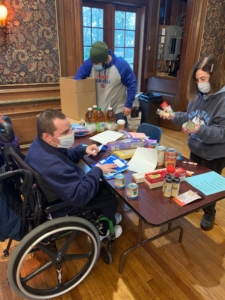
 As the big day arrived, volunteers with disabilities again led the way, including Nijah, who oversaw setup. Others prepared the boxes, packed the meal kits, and completed quality inspection. Once all boxes were packed and ready for distribution, the group delivered 100 meal kits to Island Harvest, Long Island’s food bank. In total, 400 individuals were served that day.
As the big day arrived, volunteers with disabilities again led the way, including Nijah, who oversaw setup. Others prepared the boxes, packed the meal kits, and completed quality inspection. Once all boxes were packed and ready for distribution, the group delivered 100 meal kits to Island Harvest, Long Island’s food bank. In total, 400 individuals were served that day.










